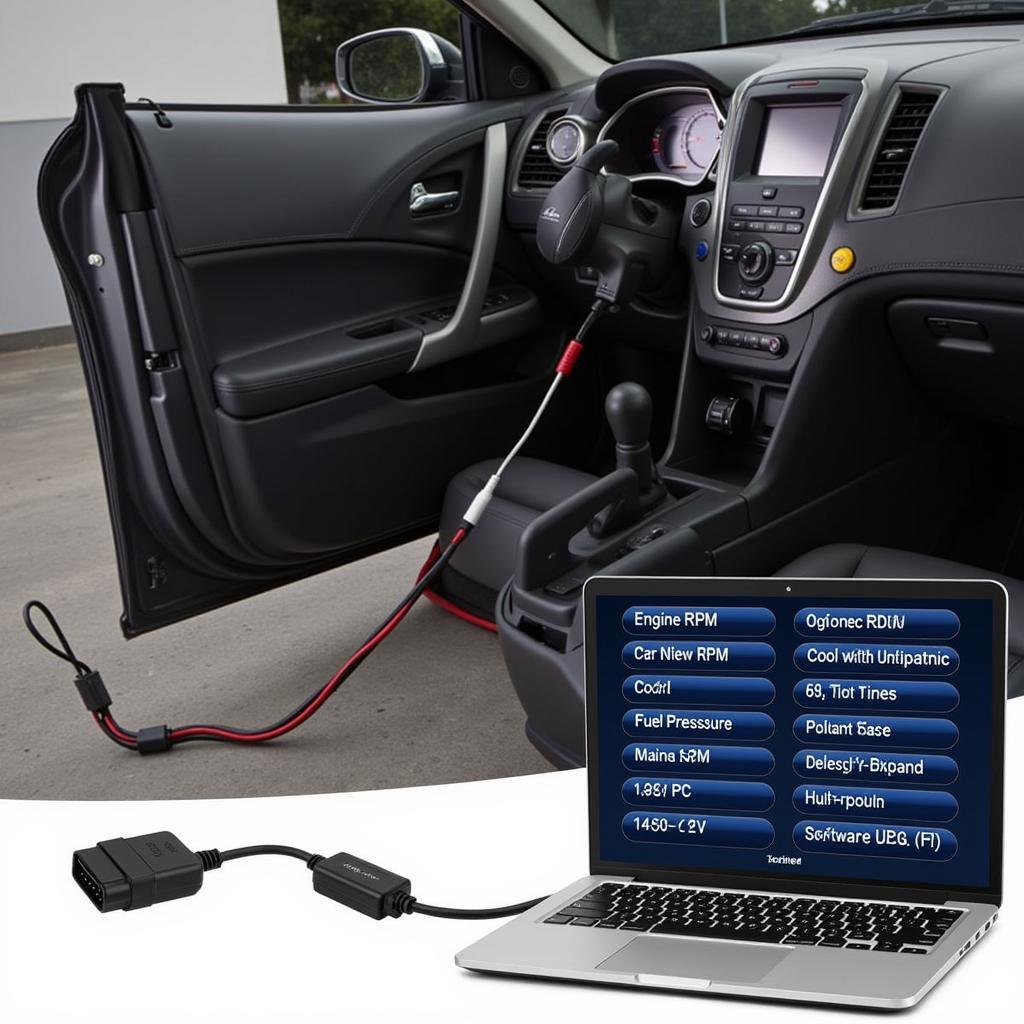Car software tools are revolutionizing how we diagnose, repair, and maintain vehicles. From professional mechanics to DIY enthusiasts, these powerful tools provide unprecedented access to a car’s inner workings, offering detailed insights that were once impossible to obtain without specialized equipment. This article explores the diverse landscape of car software tools, examining their functionalities, benefits, and the impact they have on the automotive industry.
Navigating the World of Car Software Tools
Car software tools are essentially software applications designed to interact with a vehicle’s electronic control units (ECUs). These ECUs are the brains of the car, managing everything from engine performance and transmission shifting to safety systems and entertainment features. By connecting to these ECUs, car software tools can read diagnostic trouble codes (DTCs), monitor real-time data streams, perform advanced diagnostics, and even reprogram certain vehicle modules.
 Car Software Tools Diagnostic Interface
Car Software Tools Diagnostic Interface
Types of Car Software Tools
Car software tools come in a wide range of functionalities and price points, catering to different user groups. Here are some of the most common types:
- OBD-II Scanners: These entry-level tools provide basic diagnostic functionality, allowing users to read and clear DTCs. They are affordable and suitable for DIYers looking to troubleshoot simple issues.
- Code Readers: Similar to OBD-II scanners, code readers primarily focus on retrieving DTCs. They often offer more detailed code definitions and may include some live data parameters.
- Professional Diagnostic Scan Tools: These advanced tools are designed for professional mechanics and offer comprehensive diagnostic capabilities. They provide access to a wide range of vehicle systems, including engine, transmission, ABS, airbags, and more. They can perform complex tests, bi-directional controls, and module programming.
- Specialized Software: Some software caters to specific vehicle makes or models, offering in-depth diagnostics and coding functionalities. These tools are essential for specialized repair shops and dealerships.
Benefits of Using Car Software Tools
The advantages of using car software tools extend beyond just reading trouble codes. These tools empower users to:
- Diagnose Issues Quickly and Accurately: By accessing detailed diagnostic data, mechanics and DIYers can pinpoint the root cause of problems faster, saving time and money on unnecessary repairs.
- Monitor Vehicle Performance: Real-time data streams allow users to monitor various vehicle parameters, such as engine RPM, coolant temperature, and fuel pressure, providing valuable insights into vehicle health and performance.
- Perform Preventative Maintenance: By monitoring critical parameters and identifying potential issues early on, car software tools enable proactive maintenance, preventing costly breakdowns and extending the lifespan of the vehicle.
- Customize Vehicle Settings: Some advanced tools allow users to customize certain vehicle settings, such as lighting, door locks, and comfort features, enhancing the driving experience.
Choosing the Right Car Software Tool
Selecting the appropriate car software tool depends on several factors, including your technical expertise, budget, and intended use. If you’re a DIY enthusiast looking to perform basic diagnostics, an OBD-II scanner or code reader may suffice. However, professional mechanics require more sophisticated tools with advanced functionalities and extensive vehicle coverage.
The Future of Car Software Tools
As vehicles become increasingly complex and interconnected, car software tools will play an even greater role in automotive diagnostics and repair. We can expect to see:
- Cloud-Based Diagnostics: Cloud-based platforms will enable remote diagnostics, data sharing, and collaborative troubleshooting.
- Artificial Intelligence Integration: AI algorithms will analyze diagnostic data, predict potential failures, and suggest optimal repair strategies.
- Augmented Reality Applications: AR technology will overlay diagnostic information onto the real-world view of the vehicle, assisting mechanics with complex repairs.
 Mechanic Using Augmented Reality Car Diagnostics
Mechanic Using Augmented Reality Car Diagnostics
“The rapid advancement of car software tools is transforming the automotive industry, empowering mechanics and DIYers with unprecedented diagnostic capabilities,” says John Smith, Senior Automotive Engineer at XYZ Automotive. “These tools are not just about fixing problems; they’re about understanding the intricate workings of modern vehicles and ensuring optimal performance.”
In conclusion, car software tools are essential for anyone involved in automotive diagnostics, repair, or maintenance. From simple code readers to sophisticated professional scan tools, these tools provide invaluable insights into a vehicle’s health and performance, helping to diagnose issues quickly, perform preventative maintenance, and unlock the full potential of modern vehicles. Investing in the right car software tool is an investment in efficiency, accuracy, and the future of automotive care.
FAQ
- What is an OBD-II port?
- Can I use any car software tool on any vehicle?
- What is a DTC?
- How do I choose the right car software tool for my needs?
- What are the benefits of using professional diagnostic scan tools?
- How often should I use car software tools to check my vehicle?
- Are there any safety precautions I should take when using car software tools?
For further assistance, please contact us via WhatsApp: +1(641)206-8880, Email: [email protected] or visit us at 910 Cedar Lane, Chicago, IL 60605, USA. We have a 24/7 customer support team ready to help.

Leave a Reply